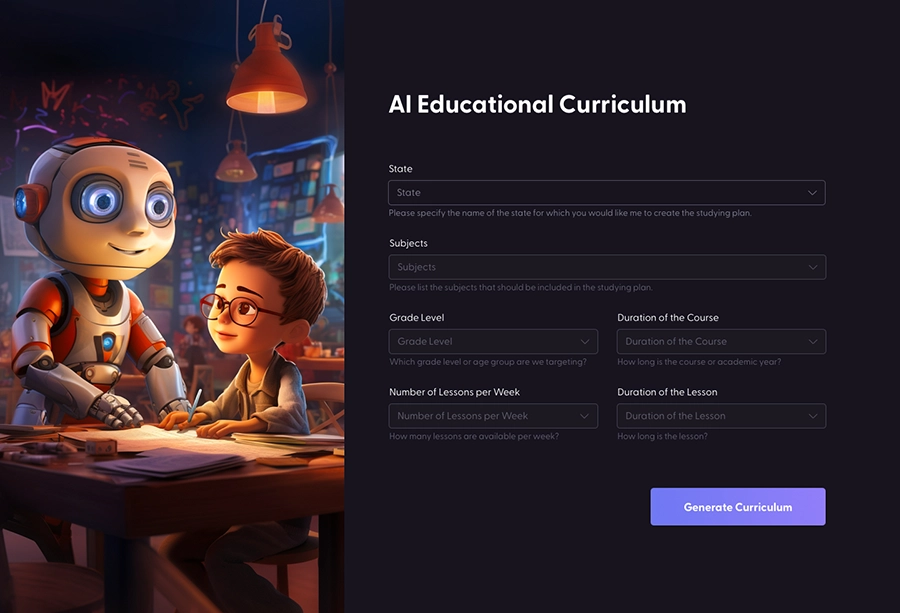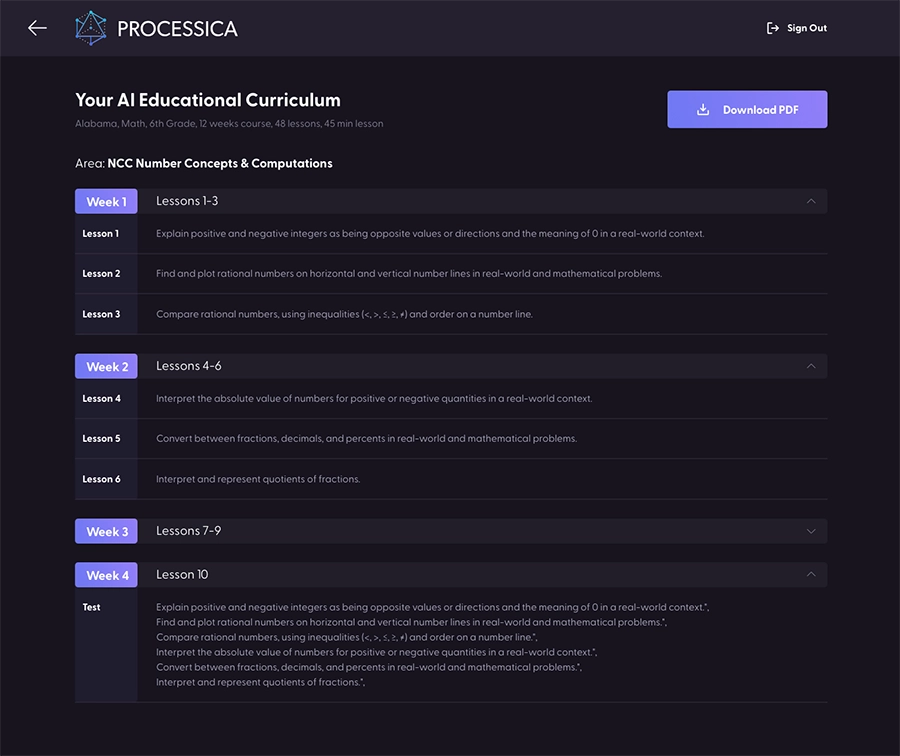- Contents
- AI in Curriculum Design
- Exploring the Benefits
- Pitfalls on the Path
- AI Curriculum – Our Case Study
- On the Horizon
- FAQs

AI in Curriculum Design
Peering beneath the surface of AI-driven curriculum creation, Generative AI emerges as the cornerstone technology. This branch of artificial intelligence focuses on creating new, unique content by identifying patterns within a provided dataset.
Within the context of curriculum creation, Generative AI offers groundbreaking potential. Initially, it absorbs a vast range of curricular materials and pedagogical resources, identifying key elements such as subject matter depth, difficulty gradients, teaching methods, assessment structures, and importantly, adherence to K-12 learning regulations.
Building upon this knowledge foundation, Generative AI uses advanced machine learning algorithms, deep learning networks, and natural language processing to craft new, contextually appropriate curricular content. It goes beyond simply replicating existing curriculum structures; it enhances them, introducing dynamic adaptability and personalized learning pathways.
Generative AI has the remarkable ability to customize these curricula, adjusting them in real-time based on each student’s learning pace, proficiency level, and areas of interest. This ensures optimal, individualized learning trajectories for every student.
Furthermore, Generative AI ensures that the newly created curricula align with the required learning standards and regulations for K-12 education. It has the capability to incorporate state standards, national benchmarks, and specific school district requirements into the curriculum, ensuring the content is not only personalized but also regulation-compliant.
This potent integration of Generative AI and curriculum creation paves the way for a new era in education – one that is more personalized, adaptable, inclusive, and compliant with the high standards of K-12 education.
Exploring the Benefits
AI-driven curriculum creation reaps multiple benefits that have far-reaching implications for the entire educational sector. One of the most profound advantages is the fostering of individualized instruction. Unlike traditional curriculums which take a one-size-fits-all approach, AI can facilitate the creation of personalized curriculums tailored to the unique learning needs, pace, and abilities of each student. This not only addresses the varied learning styles of students but also makes education more inclusive and effective.
Moreover, AI has the power to deliver the curriculum in an engaging and interactive format. Through smart, data-driven insights, it can help identify the most effective ways of teaching complex concepts, turning abstract theories into digestible, engaging content. This approach enhances students’ interest, promotes active participation and increases information retention rates. The application of AI in curriculum development thus aligns perfectly with modern pedagogical methods that emphasize experiential and interactive learning.
AI-driven curriculum creation also offers unparalleled scalability. In conventional settings, creating customized curriculums for each student or expanding the reach of high-quality educational content can be resource-intensive and time-consuming. AI, however, can automate this process and help educators reach a wider array of learners, thus democratizing access to high-quality, personalized education.
Further, AI can facilitate continuous improvement in curriculum design. By analyzing student performance data and feedback, AI can identify areas of the curriculum that need refinement. This creates a dynamic, evolving curriculum that adapts and improves over time, ensuring the curriculum remains relevant and effective.
In essence, the adoption of AI-driven curriculum development signifies a profound innovation in education. It places students at the center of education, promotes engagement and effective learning, scales up the reach of quality education, and ensures continuous improvement – all contributing to a more holistic and future-forward approach to education.
Pitfalls on the Path
While the prospect of AI-driven curriculum creation is undoubtedly exciting, it is important to acknowledge the potential obstacles and challenges that need to be addressed. One of the most significant among these is the technical limitation of current AI systems. A common misconception is that AI is infallible; however, like any other system, it is susceptible to errors and inaccuracies, particularly if the input data is flawed or incomplete.
This leads to another challenge, the requirement for large data sets. To generate accurate predictions and create effective learning curriculums, AI systems need vast amounts of data. This data collection could pose logistical hurdles, and more critically, raise potential privacy and ethical concerns. Strict data management protocols and secure infrastructure would be essential to respect and protect student privacy.
Infrastructure and investment are another potential stumbling block. Implementing AI systems in education requires considerable resources, including sophisticated hardware, robust software, and continuous maintenance. It also necessitates training for educators and administrators to efficiently use and manage these systems.
At Processica, we recognize these challenges and have integrated the solutions into our approach. Our AI systems are designed to handle large-scale data while maintaining rigorous data security standards. We utilize advanced algorithms that reduce the chances of error and increase the accuracy of the curriculum generation. Our team of experts continuously monitors and refines these systems to ensure their reliability and effectiveness.
Moreover, Processica is committed to making AI-driven curriculum creation accessible. We work closely with educational institutions to provide comprehensive training for their staff and help them adapt to this new technology. We also offer scalable solutions to cater to diverse institutional needs and resources. With a deep understanding of the technical aspects and a clear vision for the future, Processica is pioneering the path towards effective AI implementation in education.
AI Curriculum – Our Case Study
The successful implementation of AI in curriculum creation is as much an art as it is a science, requiring a delicate balance between cutting-edge technology and a deep understanding of educational requirements. A prime example of this is how our team successfully integrated AI automated curriculum creation for the education sector in USA, with the solution grounded in the GPT (Generative Pre-trained Transformer) model.

The GPT model, renowned for its capability to understand context and generate coherent text, was the driving force behind our AI solution. It used the large volumes of multi-dimensional data processed by the third-party vector database to generate comprehensive, tailored curriculums. The GPT model took into account the unique educational needs of each student in the district, transforming complex data into meaningful, personalized content.
One of the major advantages we found with third-party vector databases was scalability. Given the voluminous educational data processed by the GPT model, we needed a system that could keep pace without compromising on performance. The selected database was designed with scalability in mind and could accommodate increasing data loads smoothly.
The GPT model also played a crucial role in the verification and feedback loop mechanism we implemented. The generated curriculum content was evaluated and refined based on feedback, with discrepancies used to inform future outputs of the GPT model. This mechanism, underpinned by reinforcement learning techniques, allowed the GPT model to continually adapt and improve, resulting in an ever-evolving, effective curriculum.

Moreover, we employed a version control system to monitor the GPT model’s progression over time, adding another layer of reliability and traceability to the process.
This case study exemplifies how Processica, leveraging the power of GPT and advanced database technology, effectively drove curriculum innovation. The synergy between the GPT model and the third-party vector database, guided by our technical expertise and educational insight, made this significant advancement in AI-driven curriculum creation possible.
On the Horizon
Looking ahead, the integration of AI and generative AI in education holds immense potential to redefine the industry. AI-driven curriculum creation will likely gain more traction, and AI’s role in curriculum planning, development, and delivery will expand further. The future of education could see even more advanced personalization, effectiveness, and global accessibility, thanks to the advancements of AI and generative AI in education. Ultimately, we’re heading towards an education revolution, steered by AI-driven innovations.



